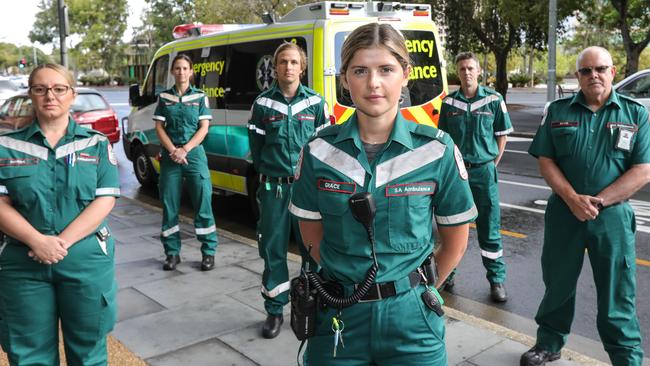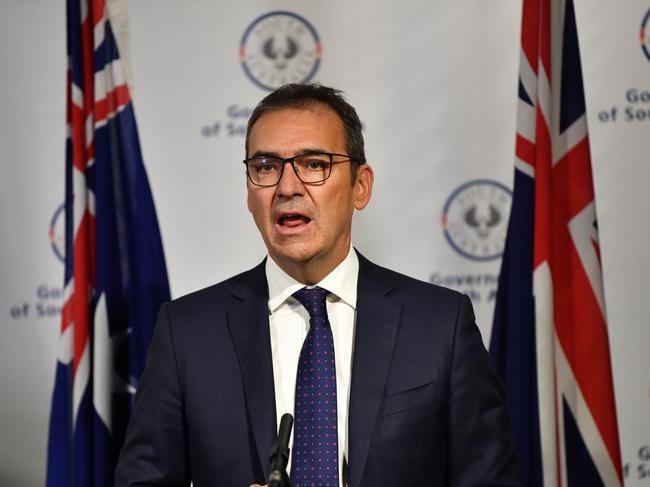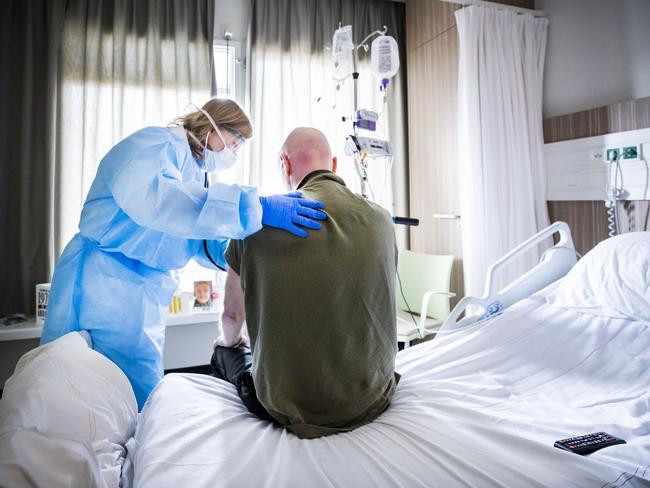SA Government strikes landmark deal to bring private hospitals into coronavirus fight
SA’s private hospitals have signed a deal to massively increase ICU capabilities; almost a hundred more ambulance officers are rolling out; and SA only recorded two more virus cases on Sunday.
SA News
Don't miss out on the headlines from SA News. Followed categories will be added to My News.
Premier Steven Marshall says an apparent shortage of flu shots is possibly because people are getting them earlier this year.
He said he would speak to Health Minister Stephen Wade about the shortage, after reports emerged of pharmacies cancelling appointments at the weekend.
He told ABC News this morning SA had ordered “more flu vaccines than even last year”.
“I think there’s a general high level of anxiety for people who are jumping in early to get those earlier than they normall would,” he said.
“The pattern of people going to get the flu vaccine has completely changed this year, but my understanding is that we’ve got plenty of flu vaccines. We’ll have more to say about that later today.”
Mr Marshall also said SA’s COVID-19 numbers had been raised by cruise ships.
It comes as the Ruby Princess docks in NSW today, with about 200 crew members suffering coronavirus-like symptoms.
Cruise ships have resulted in 120 of SA’s cases, the majority from the Ruby Princess when it docked in Sydney last month.
“It’s a disaster, let’s be quite clear,” he said.
“The reality is that South Australia was disproportionately affected. I think now we’re over 125 infections that come off of cruise ships.
”I don’t know what it is about South Australians and cruising, but we have been disproportionately affected with well over a quarter, heading towards a third, of all of our cases from cruise (ships), and that’s really skewing our figures on the national stage.”
New paramedics fast-tracked into service
Almost 100 new paramedics are set to hit the frontline, include some who have had training fast-tracked, as authorities warn against complacency in the battle against coronavirus.
SA on Sunday recorded just two new cases, taking the total to 409, amid growing confidence the curve is flattening and at a faster pace than in other states.
There are nine SA patients in intensive care, with seven in critical condition.
The Adelaide Airport cluster has increased by three cases to 28, as previously identified coronavirus suffers are now linked to it. Seventeen are baggage handlers. The other 11 are people who’ve had contact with them, including family.
Fifty-one people in SA have recovered from the virus, a number set to keep growing.
Health and Wellbeing Minister Steven Wade said he was pleased with the result, but was not entertaining any lift of restrictions as SA remained in the early stages of the challenge.
“Today’s results are the best results for SA in almost three weeks,” he said. “These results make it clear that we are not just the victims of coronavirus, (but) what we are doing as a state and as a nation is having an impact. It is saving lives.
“It is far too early to think about easing restrictions. These figures are encouraging, but they are very early.”
SA Health’s deputy chief public health officer, Michael Cusack, said low weekend numbers could be caused by fewer people seeking tests but border crackdowns also appeared to be reaping results.
“We obviously are pleased,” he said. “From previous figures, we have seen a lot of imported disease from interstate or overseas. Once that tap is switched off, you expect that there would be a decline.
“We are very happy we are not seeing the scenes that we have in Europe and the US.”
Dr Cusack said the SA public had been “fantastic” in adhering to social distancing to stop the disease spreading.
However, SA has been warned to brace for a possible winter squeeze as the State Government moves to boost hospital capacity and other services to deal with demand.
Mr Wade has announced an extra 97 paramedic recruits are ready to join other “hero” medics at the frontline.
“Just like our firefighters and volunteers were the heroes during the bushfires, our nurses, midwives, doctors and paramedics will be the heroes who are protecting us on the frontline against the coronavirus pandemic,” he said. The paramedic boost adds to more than 1000 extra nurses who have put their hands up.
SA Ambulance Service is fast-tracking an intake of 36 interns and 20 patient transport officers. They add to a recent intake of 23 graduates.
Another 18 interns have recently begun their on-the-road supervision, delivering the frontline boost of 97 staff.
Eleven additional 000 call-takers have also been brought on board.

Paramedic intern Grace Williams, 26, is already on the road, learning from experienced colleagues and mentors.
“It is a bit of a crazy time to start work for sure,” she said.
“But as long as you just adapt to the environment … it’s good. It is actually quite normal as long as you are transparent and explain the situation and why you might be taking extra precautions with your protective equipment, then they (patients) tend to be quite okay with that.”
The eventual lifting of restrictions in SA is expected to be decided as part of the national Cabinet, where all states collaborate on measures.
Dr Cusack said SA was “in a better position” than the eastern states, in part due to the bigger cities more often being the first port of arrival for international travellers.
Cruise ships have resulted in 120 of SA’s cases.
Mr Wade said he was confident adequate supplies of flu vaccines would be available this year, despite reports of shortages. Deliveries were expected by Easter.
Payroll tax abolished for JobSeeker payments
South Australian businesses whose employees qualify for the Federal Government’s $1500 per fortnight JobKeeper payments will not be charged payroll tax on it.
SA Treasurer Rob Lucas made the announcement on Sunday.
Already, the Government has abolished payroll tax for businesses with total wage bills of $1.5 million or under after having made the pledge at the 2018 state election. It has also released a $1 billion state-based stimulus package to tackle the job impacts of coronavirus lockdowns.
Under existing laws, the JobKeeper payment would attract payroll tax.
However, Mr Lucas said the State Government had “moved swiftly to exempt these payments from payroll tax, to ensure no unintended impost to businesses already impacted by the pandemic and necessary trading, travel and social gathering restrictions to limit its spread”.
“We want to do everything in our power to ensure local businesses and jobs are supported throughout the greatest economic challenge of our time,” he said.
The “urgent” legislation will be introduced to Parliament this week.
As many as 6 million Australian workers are expected to benefit from the wage subsidy, which will be issued from the first week of May but be backdated to March 30.
Push to track quarantine breakers
Quarantine-breakers would be forced to wear electronic trackers under new laws being drafted by the SA Opposition to crack down on carriers who could cause community spread.
Opposition legal affairs spokesman Kyam Maher announced the move on Sunday, ahead of the skeleton crew Parliament returning on Tuesday as the coronavirus crisis continues.
The plan would force people to wear an electronic tracking device, similar to what happens with criminals serving home detention, if they breach self-isolation or quarantine orders.
It would permit SAPOL to direct a person to wear an electronic device if they have failed to comply with an order to self-isolate or quarantine for 14 days.
If a person fails to comply with self-isolation or quarantine while wearing the device, they would face a $1000 fine.
If they interfere or tamper with the device, they face a penalty of a fine of up to $12,000 or up to 12 months in prison.
The SA Opposition says WA has made a similar move.
Mr Maher said: “It is vitally important that people comply with self-isolation or quarantine orders if they have returned from interstate or overseas or been in close contact with a confirmed case.
“Thankfully most people are doing the right thing,” he said.
“But for those who do not, forcing them to wear an electronic device is a sensible measure.”
Comment is being sought from the State Government.
Private hospitals sign deal to fight virus pandemic
As flagged by The Advertiser this week, the Federal Government would underwrite all 56 of the state’s private hospitals under the agreement, keeping more than 4500 full-time staff, including hundreds of nurses, in work.
Announcing the “historic” deal late yesterday after it was signed off by state Cabinet, Premier Steven Marshall said it would also allow the public system to access beds, equipment and expertise in the event of a COVID-19 peak.
It would also allow SA Health to boost its intensive care capacity by 40 per cent and have access to more than 1700 beds across the state.
The partnership would include public-sector use of wards and theatres, essential equipment such as ventilators, as well as personal protective equipment supplies from all private hospitals.

Declining to reveal a precise cost to taxpayers as final details were still being thrashed out, the Premier said it was worth “tens of millions of dollars”. Officials say taxpayers would only be billed for what private resources are used.
Senior Government sources also revealed concerns about how the public system would cope if private hospitals closed after all non-elective surgeries were cancelled last week to shore up beds.
“Many of our private hospitals have been doing it extraordinarily (tough) and it has been a very difficult time,” Mr Marshall said.
“They have been doing it very hard in recent weeks. The reality is we need those private hospitals to continue to operate. We need their capacity available to us.
“Public and private hospitals joining forces underscores that this is a fight we’re all united in, shoulder to shoulder; we will get through this.”
The deal emerged as the state recorded 11 new cases for the second consecutive day – the lowest spike in almost a week – bringing the SA total to 407. The new patients are aged from their teens to their 70s but investigations were continuing last night to establish if the teenager was at a school.
As heat maps last night showed a surge of cases around Holdfast Bay Council area and the number of tests exceeded 32,000, 19 patients were being cared for in the Royal Adelaide Hospital.
Of those, seven men and a woman, aged between 52 and 77, were in intensive care. Last night, seven of them were in a critical condition.
The Qantas baggage handler cluster spiked by a further six cases Saturday as authorities now investigate 25 separate cases. Among those infected is an airport security guard, who had extensive contact with the Qantas workers, including socially.
Officials returned to the airport Saturday in their desperate attempts to trace the virus source. SA Health was also investigating last night if a daughter of one baggage handler went to work while waiting for her test results, in a decision labelled “irresponsible” by the state’s deputy chief medical officer Dr Mike Cusack.
“This is so important – that if you have been identified at being at risk of having infections, particularly if you have met the criteria to have a coronavirus test then you absolutely must self-isolate,” he said. The teenager attend Henley High School with her sister, forcing it to shut this week after the pair caught the virus.

MORE NEWS:
Reason the US is suffering so much is sad and simple
Asylum seekers struggle as virus takes livelihoods
A Drakes supermarket and a McDonald’s restaurant where the pair work, near the airport, will stay open despite the teens testing positive.
Their mother also works at Findon National Pharmacies.
Mr Marshall said while there was no “exponential growth” in SA cases, the rules would not be relaxed soon.
“My biggest concern going forward is complacency,” he said. “I don’t want anybody to think that we can relax the reaction that are in place.”
His “very clear message” was that Easter and school holiday travel this year is “completely and utterly off”.
Seasonal workers to help harvest
Seasonal workers will be able to continue to cross state lines and travel through the regions in a bid to keep food production in South Australia going.
The Federal Government has handed a lifeline to temporary workers who are seen as essential to ensure farmers have enough labour to plant and pick their crops.
However, employers are being warned they must make sure nomadic workers are practising proper social-distancing and self-isolation.
The new measures were made Saturday at the same time Premier Steven Marshall, and regional doctors again urged South Australians to stay at home this Easter.
SA health professionals and political leaders are concerned coronavirus, mainly seen in metropolitan areas, could spread to regional areas.
Mawson MP Leon Bignell, whose seats covers Kangaroo Island and parts of the Fleurieu Peninsula was Saturday erecting signs urging visitors to stay away.
New temporary changes to backpacker visas mean they will be able to stay up to a year longer in Australia to help with harvesting.
Prime Minister Scott Morrison had earlier urged other visa-holders to head home straight away. Agriculture Minister David Littleproud said the food sector was “underpinning our national security”.
“I say to every other regional Australian out there … please do not panic,” Mr Littleproud said.
“The fact that you will see an influx of workers from other nations to come and continue the agricultural supply chain is an important one and we are doing it with protocols that will keep you safe.”
Renmark Mayor Neil Martinson agreed, saying: “It is very important we have access to these workers.
“It will create some challenges and it is important that they do the self-isolation measures.
“But it will be up to the employers to make sure they have suitable accommodation for workers to self-isolate.”
Mr Martinson said there was still months of work in his region from picking almonds to grapes and oranges.
“Unfortunately, we have to have backpacker pickers because a lot of Australians don’t see manual work as work that they want to do,” Mr Martinson said.
Mr Littleproud said visa-holders could be provided with accommodation in areas with limited numbers of people because of the virus preventing tourism travel.
— Matt Smith
